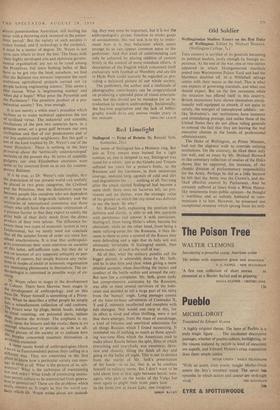Red Limelig ht Stalingrad — Paint of Return. By Ronald Seth.
(Gotta ncz, 21s.) THE name of Stalingrad has a Homeric ring. But just as Troy towers were burned for a light woman, so. one is tempted to say, Stalingrad was razed for a whim : just as the Greeks and Trojans suffered ten years for a prince's frolic, so the Russians and the Germans, in their monstrous courage, endured long agonies of cold and dirt and degradation for . . . nothing at all. Not long after the attack started Stalingrad had become a mere shell: there were no factories left, no pro- visions and no shelter; even the strategic value of the ground on which the city stood was dubious to say the least. So why?
Mr. Ronald Seth, explaining the position with deftness and clarity, is able to ask this question with pertinence and answer it with. conviction. Stalingrad. from being Hitler's whim, became his obsession; while on the other hand, from being a mere rallying-point for the Russians, it then be- came to them at once a symbol of the Russia they were defending and a sign that its holy soil was ultimately inviolable. If Stalingrad stands, then Russia stands : of such is the stuff of war.
All of this, what the military pundits call the bigger picture, is admirably done by Mr. Seth; and he is also firm and clear when giving a more detailed account, when describing the tactics and conduct of the battle within and around the city. But now for a complaint. Mr. Seth, given tardy but comprehensive assistance by the Russians, was able to meet several survivors of the holo- caust and decided to tell a large part of his story from the 'human' angle. Long passages consist of the hour-to-hour adventures of Comrades X, Y and Z, minutely recollected and complete with full dialogue. Nor would one carp at this, for its effect is vivid and often thrilling, were it not that there emerges, from the mass of anecdotage, a kind of fulsome and uncritical admiration for all things Russian which I found nauseating. It reminded me of nothing so much as those appall- ing war-time films which the Americans used to make about Russia before the split, films in which everything and everybody was sweetness, devo- tion and chastity, tilling the fields all day and
going to the ballet all night. This is not to detract from the merits of Mr. Seth's presentation of the battle—in so far, that is, as he confines himself to military terms. But I don't want to be told about love at first sight between heroic teen-
agers, who part on the banks of the Volga but meet again to plight their troth years later. . . . In the front row at Swan Lake, one imagines.
SIMON RAN. EN














































 Previous page
Previous page